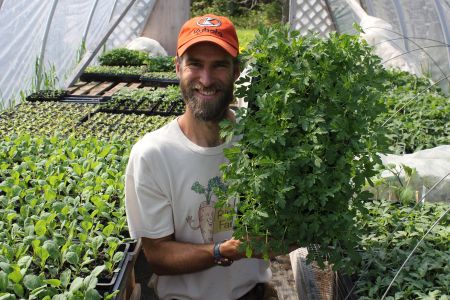Do I Need To Harden Off My Seedlings Before Planting? Yes and Here's How
I did not grow up farming. Not even close! (Suburb outside of Austin, Texas)
I had no idea what “harden off” meant as a kid until I started working on a vegetable farm in my early 20's.
Now that I've run my own organic vegetable farm with my husband for over 15 years, I do know a thing or two about hardening off plants (and what happens if you don't!).
But, if you're like I was and you're not sure what I'm talking about, no worries! I'm here to help because I want you to have success the first time!
And rest assured, it's easy, and you can do it!!

What does “harden off seedlings” mean and why do you do it?
Let's face it, your little seedlings have lived the definition of sheltered lives. Warm and toasty inside a heated greenhouse controlled for the perfect temperature, moisture, light, and wind. These little beauties have not faced the “real world” and need to be cautiously introduced to it in order to not “shock” them when you plant them in the garden.
To "harden off seedlings" means to carefully introduce them to the "real world" of unregulated light, temperature, moisture, and wind.
The hardening off process is important to prevent seedling failure.
The hardening off process is not hard but it is crucial to success with seedling plants.
What needs to be hardened off?
All plants that were raised in a controlled environment and are intended to be planted out into an outdoor garden setting (garden, raised beds, planting boxes, etc.) need some sort of hardening off process.
So if you bought seedlings from Ripley Farm or another local farm or even from a box store these seedlings likely need a little time to be introduced to the elements before being planted outside.
Hardy bare root perennial plants that we grow in the field do NOT need to be hardened off. These are ready to go straight into the garden upon receipt.
Who needs to harden off plants?
You!
Unless you are planting all seeds in your garden and no seedlings, then you need to harden off your plants! Don't rely on the establishment you bought your plants at to do it for you, because they might not have.
And in our case, we definitely have not done it.
How do you harden off seedlings?
Note: The seedlings you bought from Ripley Farm are NOT already hardened off, so please don’t skip this process.
The process of gradually adapting young plants to increased light, wind, colder temperatures and less frequent watering will help them transition more successfully into the “real world.”
Skipping this step can result in seedlings experiencing transplant shock and a greater possibility of seedling failure.
- Check the weather forecast for mild weather. Look for a spread of 2-3 days of no frosts, not strong winds, not really hot, and not pouring rain.
- Find a spot that is close to water and is in full sun or partly shaded.
- Bring plants outside to your spot for 2-3 days of mild weather before planting them. That way they'll get used to the direct sun, ambient wind and outdoor temperatures while still in their pots with their roots undisturbed.
- You may want to bring them in at night if there is a frost expected. Otherwise you can keep them outside and water them as needed, but don't flood the little pots.
- Plant your plants outside in your garden after the above 2-3 days are over. That way they'll be more ready to go in!
When do you plant your hardened off seedlings?
After you go through the process above of 2-3 days of hardening off, your plants are ready to plant. That being said, please check the forecast for a stretch of 2-3 warm-ish sunny days before you plant your tender crops like tomatoes, basil, cucumbers, beans, etc. They will do much better getting settled in during warm conditions rather than cold and wet where they can rot and die.
If you are planting cold hardy things like broccoli, cabbage, lettuce, spinach, kale, etc. go ahead and put them out as they can handle the cool and wet conditions. Now is also a good time to direct seed your carrots, beets, radishes, peas, potatoes, etc.
For more info on when to plant what in Central Maine based on our farm's 15 years of experience, check out this blog post: Our Four Best Tips For a Successful Gardening Season No Matter What.
Here we are now again almost to the big day when our little plants go out to you! It sure is a good feeling to pack up the orders and dream about the new homes and gardens that the plants will grace. It brings us hope and joy as farmers!
And we want you to have success with the plants! So please be sure to read up on this simple task BEFORE you plant so you aren't disappointed with your results.
Happy Gardening!!!



Add new comment
Comments (1)
No rush
Fri, 2024-05-17 09:25